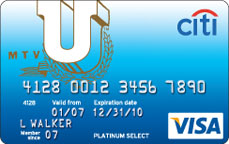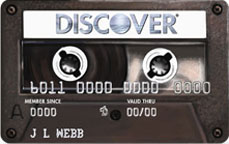Students, listen closely. In this article we discuss some of the best student cards you can get. If this is your first credit card, a student card is the way to go. They can help you build credit, and the best part about it is this: banks know you’re still building credit, so you can qualify for most student cards without a credit score. There are quite a few student cards out there, though, and you may be confused by all the options. That’s why we simplified it a little bit for you. Here are some of our favorite picks, along with important information about them to help you make up your mind about the best card for your personal spending habits.
Citi mtvU Platinum Select Visa Card for College Students
 This card has an APR of 12.99% to 20.99% APR, depending on “creditworthiness” (things like your credit score and report). This is pretty average. The points are pretty good; they’re a bit like a couple cards’ rotating categories, except better: you get 5 points in certain categories, but you don’t have to enroll, and the categories don’t change. If you know you spend a lot in these categories, you should consider this card.
This card has an APR of 12.99% to 20.99% APR, depending on “creditworthiness” (things like your credit score and report). This is pretty average. The points are pretty good; they’re a bit like a couple cards’ rotating categories, except better: you get 5 points in certain categories, but you don’t have to enroll, and the categories don’t change. If you know you spend a lot in these categories, you should consider this card.
The categories that get 5 points are: restaurants and fast food, bookstores, music stores, video rental stores, and movie theaters. I spend a ton on food, and a bit at bookstores and movie theaters, so this is a good card for me. In fact, I have it. You even get rewarded for having a good GPA; from 250 points for a 2.5, up to 2,000 points per semester for a 4.0.
Discover Student More Card
 With an interest rate of 12.99% to 19.99%, this student card from Discover offers 5% cash back in certain categories (see the link above for the categories). The problem with this card is that you have to enroll every quarter to qualify for the 5% cash back. Many of us will get busy and forget to enroll, then we’ll miss the 5% for the entire quarter. If you have a good memory or a good way of keeping track of the rotating rewards, you can earn some points with this card.
With an interest rate of 12.99% to 19.99%, this student card from Discover offers 5% cash back in certain categories (see the link above for the categories). The problem with this card is that you have to enroll every quarter to qualify for the 5% cash back. Many of us will get busy and forget to enroll, then we’ll miss the 5% for the entire quarter. If you have a good memory or a good way of keeping track of the rotating rewards, you can earn some points with this card.
Also of note is that the 1% unlimited cashback bonus (on items that don’t fall under the 5% categories) only kicks in after the first $3,000 of spending each year. Before that, you only earn 0.25%. If you’re not a big spender, this can reduce your rewards by a large percentage. On the other hand, if you are a big spender, this card isn’t so great either. After a certain dollar amount in each category, the 5% reverts to 1%. With caps on the upper limit of 5% rewards, plus a level you have to reach to earn your full rewards, this card falls short of the mtvU.
Something to keep in mind is that Discover points are worth more than most rewards points. You can get a $25 gift card for 2,000 points (sometimes, although it depends on which gift card you choose), while a $25 gift card with Citi’s ThankYou rewards will cost you around 3,500 points. Citi will give you a full penny per point if you redeem $100 gift cards, but below that the point value isn’t so good. Still, you probably won’t get as many rewards with Discover’s card.
Journey Student Rewards Credit Card
 Finally, a card that doesn’t have special categories that earn extra points. Categories can either hurt or help you, and if most of your spending doesn’t fall into one of the popular categories, this is the card you want. It offers 1% cash back on every purchase, no caps or minimum amounts to qualify. 1% isn’t anything special, but you get a 25% bonus on your earnings if you pay on time each month. 1.25% on everything can sometimes earn you more than 5% on a few things and 1% on everything else.
Finally, a card that doesn’t have special categories that earn extra points. Categories can either hurt or help you, and if most of your spending doesn’t fall into one of the popular categories, this is the card you want. It offers 1% cash back on every purchase, no caps or minimum amounts to qualify. 1% isn’t anything special, but you get a 25% bonus on your earnings if you pay on time each month. 1.25% on everything can sometimes earn you more than 5% on a few things and 1% on everything else.
Another great thing about this card is that points don’t expire. Discover Cashback points don’t either, but ThankYou points do. This card has a variable interest rate of 19.8%, regardless of your credit score.
Final Words
One thing you’ll notice is that I didn’t spend a lot of time comparing cards on interest rate. That’s because, with the exception of the Journey Student Rewards card, most student credit cards have very similar rates. Currently, most student cards offer rates from about 13% to about 21%, depending on the student’s credit. It’s not smart to carry a balance on a student card, but if you think you might, it’s a good idea to stay away from the Journey card, since its rate for all students is on the upper end of that range.
With credit cards, there’s no one-size-fits-all solution. Some people will earn more rewards points with the Citi mtvU card, some will earn more with the Journey Student card. Before you pick a credit card, it’s important to analyze where your spending goes, and calculate which card would be best for you. With that said, if you don’t want to break out the calculator, I can tell you that my favorite card I spotted was the Citi mtvU Platinum Select.
